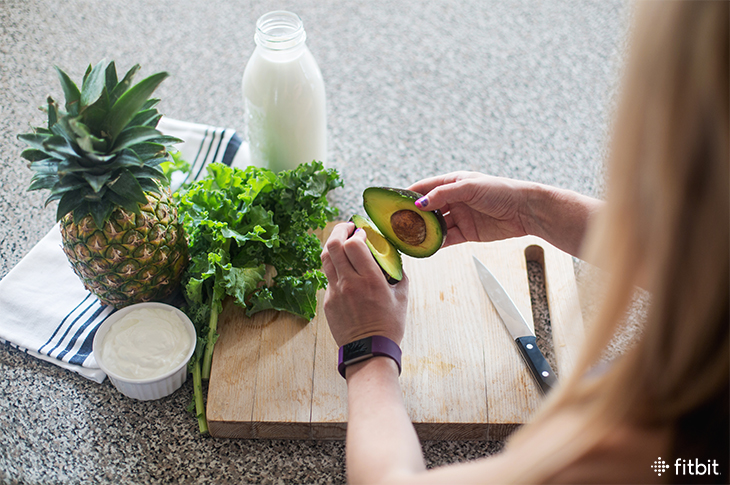
Nutrition can seem complicated at times. Particularly when you know there are certain nutrient goals you need to hit each day in order to be healthy. So, you’ll often hear nutritionists talking about trying to eat enough fiber, protein, and potassium, but not too much added sugar, sodium, or saturated fat. And it’s probably at this point when your eyes start to glaze over, and you wonder if it’s even possible to get all the nutrition you need in one day? Well, yes, it is! All it takes is a little savvy meal planning (which is already done for you below!) and you can pack everything you need into three meals and two snacks.
So, to take the guesswork out of what you should be getting on your plate, here’s a meal plan that provides around 1,800 calories and all the essential nutrients you need each day.
Nutrients Missing From the Average American Diet
The most recent dietary guidelines suggest people aren’t eating enough veggies, fruit, whole grains, seafood, or dairy. And are eating too many foods high in saturated fats, added sugars, and sodium (aka processed foods). No surprises there!
To dig into the details, specific nutrients that are lacking in current eating patterns include:
Vitamin D. Good sources include fortified dairy products, eggs, salmon, and mushrooms that have been exposed to sunlight.
Calcium. Good sources include milk, yogurt, and cheese, fortified non-dairy milks like soy and almond milk, fish with edible soft bones.
Iron. Women aren’t getting enough iron. Good sources include iron-fortified breakfast cereals, pumpkin seeds, tofu, oysters, white beans, red meat, and spinach.
Potassium. Good sources include potatoes, beets, green leafy vegetables, white beans, plain yogurt, sweet potatoes, salmon, edamame, and bananas.
Fiber. Good sources include beans, lentils, vegetables, fruit, whole grains, nuts, and seeds.
The meal plan below includes all these missing nutrients, plus more. Let’s dig in!
Breakfast: Superfood Banana Berry Smoothie
Homemade smoothies are an easy way to get your day off to a great start, and can pack in tons of nutrients like vitamin C, fiber, protein, probiotics, and potassium. In your morning meal you’re aiming to include a serving of fruit or veggies, some healthy carbs, and a good dose of protein (Think: plain Greek yogurt, milk, nuts, or seeds) to keep your hunger at bay for a few hours.
Save time for busy mornings by prepping your smoothie ingredients the night before: measuring out your fruit ingredients and placing them in the freezer overnight. That way, you can blend and go in the morning!
INGREDIENTS:
¼ cup fresh blueberries
¼ cup sliced strawberries
½ banana (fresh or frozen)
¼ cup rolled oats
1 cup (8 oz/250 g) low-fat plain Greek yogurt
½ cup unsweetened coconut water
½ cup ice cubes
Add ingredients to a blender and combine. Makes 1 serving.
Nutrition facts (per serving): 350 calories, 6 g total fat, 3 g saturated fat, 25 mg cholesterol, 110 mg sodium, 49 g carbs, 5 g fiber, 26 g total sugars, 0 g added sugars, 27 g protein, 291 mg calcium, 1 mg iron, 886 mg potassium
Tip: If you are vegan or dairy free, here are other ways to add protein to your smoothie.
Mid-Morning: Antioxidant and Calcium Boost
Reaching for a morning pick-me-up like a tall skinny latte can provide you with a boost of antioxidants from the caffeine, plus protein, potassium, and calcium from the nonfat milk. Hold off on pumping your caffeine kick full of added sugars from syrups and sweeteners, and allow your taste buds to enjoy the natural sugar present in milk, aka lactose.
Nutrition facts (per serving): 102 calories, 0 g total fat, 0 g saturated fat, 7 mg cholesterol, 125 mg sodium, 15 g carbs, 0 g fiber, 14 g total sugars, 0 g added sugars, 10 g protein, 347 mg calcium, 0 mg iron, 507 mg potassium
Lunch: Nutrient-Packed Salad
If you’re looking for a way to overload on nutrients, salads are hard to beat! Using dark greens like kale or spinach as your base helps you load up on nutrients like vitamins A, K, and C! Add extra veggies for even more nutrients, flavor, and color, a sprinkling of healthy whole grains like quinoa, and about 3 to 4 ounces of lean protein. Top with a small amount of healthy fats like nuts or avocado, which will provide vitamin E, fiber, magnesium, and folate. Bonus: Some nuts like walnuts contain omega-3 fatty acids. Be careful not to add too many extra toppings like bacon bits, croutons, or creamy dressings, which can sneak in too many calories.
INGREDIENTS:
2 cups kale or spinach
½ cup cherry tomatoes
1 cup cooked quinoa, brown rice, or whole-wheat couscous
3 oz (90 g) lean protein like chicken, salmon, or 1 cup of cooked beans
2 tablespoons walnuts or ½ avocado, sliced
1 tablespoon balsamic vinegar
Salt and black pepper
Combine ingredients in a bowl. Season with salt and pepper. Makes 1 serving.
Nutrition facts (per serving): 500 calories, 17 g total fat, 2 g saturated fat, 85 mg cholesterol, 460 mg sodium, 50 g carbs, 8 g fiber, 7 g total sugars, 0 g added sugars, 39 g protein, 1,112 mg calcium, 4 mg iron, 1,056 mg potassium
Snack: Make it Satisfying
Your mid-afternoon snack should give you an energy boost and contain enough protein or fiber to fill you up until dinner. Aim for less than 250 calories and at least 5 grams of fiber and/or 10 grams of protein.
Suggested serving:
2 cups petite carrots or sliced bell pepper
2 tablespoons hummus
1 (20g) mozzarella cheese stick
Makes 1 serving.
Nutrition facts (per serving): 200 calories, 7 g total fat, 3 g saturated fat, 0 g trans fat, 15 mg cholesterol, 400 mg sodium, 26 carbs, 6 g fiber, 11 g total sugars, 0 g added sugars, 9 g protein, 223 mg calcium, 1 mg iron, 810 mg potassium
Pre-Dinner: Light Nibbles
Feeling adventurous? Make your own kale chips! Place fresh kale on a baking sheet, drizzle with extra-virgin olive oil and a dash of sea salt, and bake at 300˚F (150˚C) for about 20 minutes or until crisp. Store in an airtight container and you can nibble on a low-cal snack as you prepare dinner.
Nutrition facts (per serving): 60 calories, 5 g total fat, 1 g saturated fat, 0 g trans fat, 0 mg cholesterol, 10 mg sodium, 3 carbs, 1 g fiber, 1 g total sugars, 0 g added sugars, 1 g protein, 48 mg calcium, 1 mg iron, 157 mg potassium
Dinner: Balance Your Plate
Keep dinner simple, light, and balanced by filling half your plate with veggies, a quarter with protein, and a quarter with healthy fiber-rich carbs. Loading up on veggies will keep the calories in check, and at the same time fill up on fiber and nutrients like potassium, vitamins A and C, and folate.
Try this Crispy Salmon with Fingerling Potatoes & Asparagus. It packs in tons of protein, omega-3’s and other healthy fats, and potassium, along with fiber-rich healthy carbs. Makes 4 servings.
Nutrition facts (per serving): 430 calories, 24 g total fat, 4 g saturated fat, 65 mg cholesterol, 120 mg sodium, 26 g carbs, 5 g fiber, 3 g total sugars, 0 g added sugars, 29 g protein, 80 mg calcium, 3 mg iron, 1,278 mg potassium
You can find more quick, easy, and healthy dinner ideas here.
Dessert? Yes, Please!
End your day with a couple of squares (about 1 ounce) of dark chocolate, or a piece of fresh fruit. Chocolate contains antioxidants, fiber, magnesium, iron, and zinc.
Nutrition facts (per serving): 170 calories, 12 g total fat, 7 g saturated fat, 1 mg cholesterol, 6 mg sodium, 13 g carbs, 3 g fiber, 7 g total sugars, 7 g added sugars, 2 g protein, 21 mg calcium, 3 mg iron, 203 mg potassium
TOTAL DAILY NUTRITION FACTS:
Calories 1,810
Protein 117 g (25 percent total calories)
Total fat 72 g (35 percent total calories)
Saturated fat 19 g (9 percent total calories)
Cholesterol 195 mg
Carbs 182 g (40 percent total calories)
Fiber 28 g
Total sugars 69 g
Added sugars 7 g
Sodium 1,240 mg
Vitamin D 3 µg
Calcium 1,121 mg
Iron 14 mg
Potassium 4,897 mg
And Finally, Don’t Forget to Hydrate and Get Some Sunshine
Although water isn’t a nutrient, it helps to facilitate many essential processes throughout the body. Aim to drink at least eight 8-ounce glasses of water (a total of 64 ounces) throughout the day. You’ll need more if you’re exercising or sweating a lot. And try to go for a walk to top up your levels of the “sunshine” vitamin D. Generally, getting about 10 to 15 minutes of sun on your arms and legs a few times a week is enough to give you nearly all the vitamin D you need. If that’s just not possible, you might consider speaking to your doctor about prescribing a vitamin D supplement to help give your levels a boost.

Author: Lindsey Sherman-Bennie is a Registered Dietitian and Certified Health Coach at Fitbit. She has a Master’s Degree in Health Promotion and has been a practicing Dietitian for 12 years. In her free time, you can find her at the ice rink where her two children skate competitively or spinning on her bike.
This information is for educational purposes only and is not intended as a substitute for medical diagnosis or treatment. You should not use this information to diagnose or treat a health problem or condition. Always check with your doctor before changing your diet, altering your sleep habits, taking supplements, or starting a new fitness routine.
If you have questions about a Fitbit tracker, product availability, or the status of your order, contact our Support Team or search the Fitbit Community for answers.
Please note: Comments are moderated and may not appear immediately after submission.